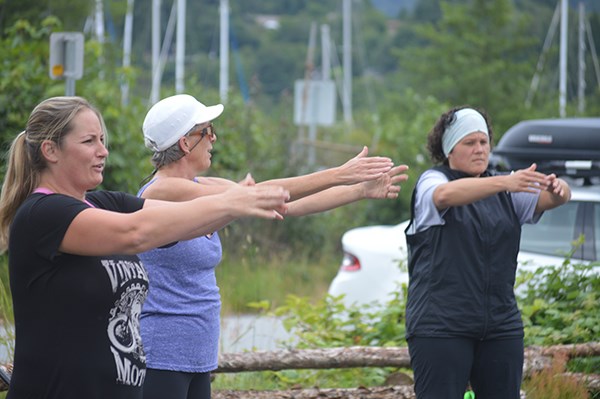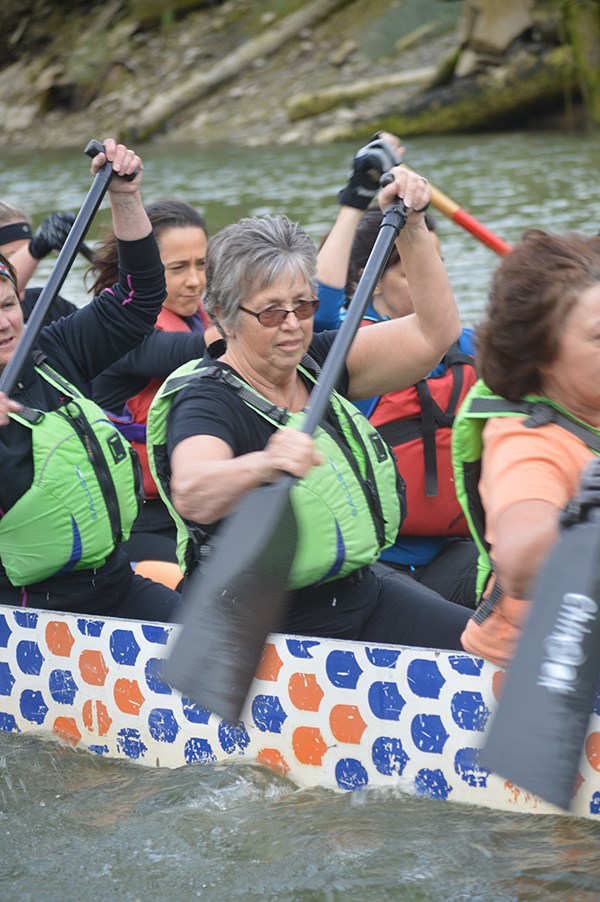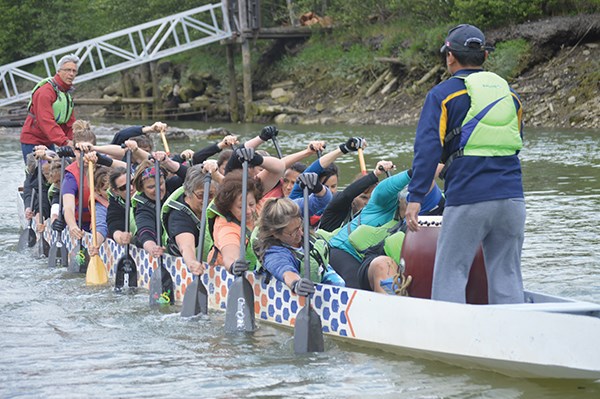It’s a drizzly Thursday evening with thunder and lightning threatening, but this isn’t stopping 20 women from veering out into the waters around Squamish, at least until the weather gets worse.
To the steady thump of the coach’s drumbeat, the dragon boat team makes its way out of Cattermole Slough for an hour or so of practice.
“We always treat it as a dance to get rhythm,” president Dawn Lecky said.
The women are members of Chawanda, the local dragon boat team that has provided both camaraderie and competition for its members since 2009.
Dragon boat racing has been described as one of the fastest growing sports, even though it has a long history.
While Chawanda is the current team, it exists under the auspices of the local association, which hopes to set up mixed and youth teams to compete in dragon boat events.
“We’re always looking for new people,” longtime member Cathie Greenlees said.
During the interview, she even makes a pitch to a customer at her workplace curious about the sport.
Dragon boating dates back to ancient China where it was used for religious ceremonies, according to the International Dragon Boat Federation. As a modern sport, it really began to take off during the 1970s after the tourist association in Hong Kong staged an international festival. By 1976 the first official international races were staged there. The IBDF was eventually formed in 1991.
On its website, the federation estimates more than 50 million in China take part in the sport, along with more than 300,000 in Europe and the United Kingdom, another 90,000 in Canada and the U.S., and still more in places like Australia, New Zealand, the Caribbean, African and the countries of the Pacific basin.
In Squamish, the team got started officially back in 2009, though things really began about a year earlier, Greenlees says.
Carl Mendoza, the team’s first coach, and Ted Prior had found a boat from Vancouver and brought it to Howe Sound, says Greenlees. From there, the team started to organize.
The reasons for joining are varied. Lynda Maximenko joined about a year after the team started. Her real exposure to the sport though came while camping at Christina Lake, B.C.
“We had a campsite on the water, and I would hear the drumming and I would see the dragon boaters from Christina Lake, the Robusters, coming by,” she said. “It always just intrigued me.”
Once back in Squamish, where she taught yoga, one of the people from her class told her about the local group, and from there she joined up.
For Karen Millard-Sumalileng, she decided to get involved when she moved to Squamish as a way to meet friends.

She also happened to meet her husband – and coach – Macky Sumalileng. “It was just an added bonus,” she said.
Macky had come to Vancouver from the Philippines for the World Police and Fire Games boat, then stayed on to help with dragon boating. From there, he started helping with the team as steersman and assistant coach before becoming head coach.
Lecky joined the team about a year after its inception with some nudging from her doctor, who told her she needed some regular exercise. Beyond the physical benefits, Lecky also finds being out on the water a good way to relax. She has her own business, is a nurse and has four sons, so dragon boating helps keep her calm.
“Within five minutes of just trying to catch your breath… your mind just clears of everything,” she said.
With the physical demands of the sport, it is obviously important for everyone to warm up, so every practice begins on a patch of land near the foot of the Cattermole Slough.
On this night, veteran Maximenko leads the group through a mix of squats, stretches, jumping jacks and other moves designed to warm up the muscles.
Then it’s off to the boat, as the team pushes away from the dock and glides out into the waters.
Typically the Chawanda team practices three times a week between March and October, though they will add an extra practice if there is a competition coming up.
Member Carolyn MacDougall says it takes her a while to get her stroke back at the start of each year, which makes the practice all the more important.
“You never really perfect your stroke, I don’t think,” she says. “If everyone isn’t working together, you’re not going anywhere.”
The team usually competes in four or five events each summer.
Last year the team brought home a silver medal from a race in Steveston and a gold from Nanaimo.
Most recently, they took part in the Vancouver International Dragon boat Festival, where they finished second in one category but were moved up to race against stiffer competition.
The team is also taking part in other events this year in places like Victoria, Penticton and Harrison Hot Springs.
The competitions offer some downtime, so members can watch other races or hang out and relax to rest up for the next race.
Over the years, they have had some more memorable experiences at competitions, like in Victoria where they just missed a medal, finishing fourth in a race that came down to hundredths of seconds.
Perhaps the biggest surprise came at a competition in the San Francisco area where they arrived to find the other teams competing were mixed teams.
“We had one man, and we ended up getting silver,” Maximenko said.
Chawanda typically uses boats provided by race organizers, which saves them from having to transport their boat, but competing still requires money. The team has had a main sponsor, AC&D Insurance, in recent years to help them with costs, but like many organizations, it raises money with events such as beer-and-burger fundraisers or garage sales. At the top of its list is a new dragon boat to hold up to 24 people.
“We need a new boat. The boat we have needs lot of repairs,” Greenlees said.
They did buy a smaller, 10-person boat, but their larger main craft has been around for a while.
Some of the members have been on board since the early days too, but the team is always happy to see some new faces. People can try the sport for free the first time, or pay a drop-in fee to start.
To help add to the ranks, the team has been holding learn-to-paddle sessions at the beginning of the season, running through April and May.
“The learn-to-paddle session has been a great success in my eyes,” Lecky said.
The latest sessions added seven new members to the ranks, meaning the already growing popularity of the sport just grew a little bit more.
“We really went out and recruited,” Maximenko said. “They bring energy and enthusiasm. They’ve really committed themselves.”
The veteran members add there is always room for more, especially as they hope to increase the association’s numbers and start up those mixed and youth teams.
“It’s a good time to join the team because we’re really building,” said Millard-Sumalileng.
There is more information about the Squamish Dragon Boat Association on its Facebook page.




